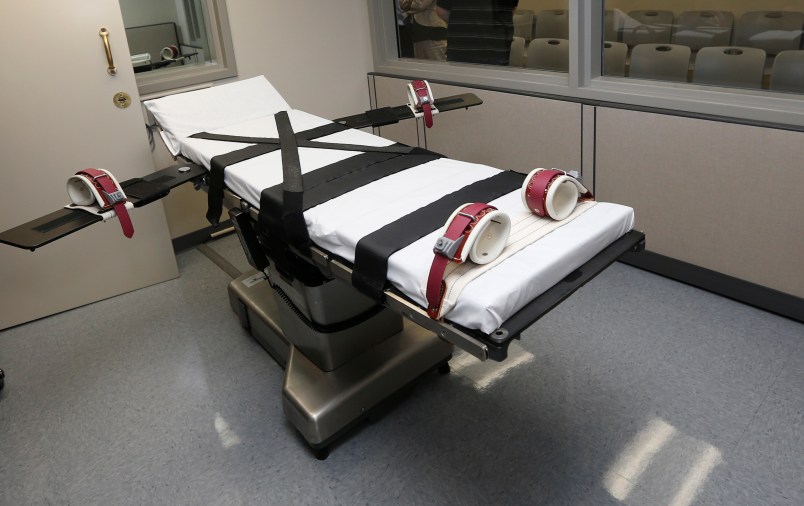OKLAHOMA CITY (AP) — Exactly one year after a botched lethal injection, attorneys for other Oklahoma death row inmates were set to ask the U.S. Supreme Court on Wednesday to outlaw a sedative used in the procedure — a ruling that could force several states to either find new execution drugs or change the way they put prisoners to death.
The lawyer for one of the inmates said midazolam has been a “spectacular failure” as the first of a three-drug combination for lethal injections, even beyond the 43-minute execution of Clayton Lockett that sparked the lawsuit. Lockett writhed on the gurney, moaned and clenched his teeth for several minutes on April 29, 2014, before Oklahoma prison officials belatedly tried to halt the process.
“There have been cases throughout the United States that have been reported in which midazolam has not sedated the condemned,” said Mark Henricksen, who is representing Richard Eugene Glossip in the case.
Three months before Lockett’s execution, Ohio inmate Dennis McGuire snorted and gasped as he was strapped to the gurney and didn’t die until 26 minutes into the procedure. It was the only time Ohio had used a two-drug combination that included midazolam, and prison officials have since abandoned it. Officials in Arizona have said they are also abandoning the drug and will try to obtain others for executions.
Assistant Federal Public Defender Dale Baich, who represents some death row inmates, said a ruling in favor of the inmates would apply to a handful of states that use midazolam as part of their lethal injection protocol.
“Lethal injection as a method of execution would not come to an end, but states would not be able to use midazolam,” Baich said.
Four states have used midazolam in executions: Arizona, Florida, Ohio and Oklahoma. Another three states, Alabama, Louisiana and Virginia have execution procedures that allow for midazolam but have not used the drug in executions, said Megan McCracken, a death penalty expert at the University of California at Berkeley law school.
The Oklahoma lawsuit was filed by 21 inmates, but only attorneys for the three whose executions have been scheduled for this year will make arguments Wednesday — the one-year anniversary of Lockett’s death. They’re urging justices to rule the drug unconstitutional because it’s possible an inmate would remain aware even after the drug was administered, resulting in severe pain when the next two drugs are injected.
But Oklahoma Attorney General Scott Pruitt has asked the high court to dismiss the lawsuit, arguing in legal papers that lower courts have ruled the dosage of midazolam called for by the state’s execution protocol is likely to render death row inmates unconscious during their executions.
“So far, seven courts have reviewed the same facts that will be considered by the U.S. Supreme Court, and all seven have ruled that Oklahoma’s lethal injection protocol is constitutional,” Aaron Cooper, a spokesman for Pruitt, said in an email. “The facts determined by the lower courts are well supported by the record and medical literature.”
Lockett’s execution was the first time Oklahoma had used midazolam. On Jan. 15, another Oklahoma death row inmate, Charles Warner, was put to death using the same three-drug combination that was used in Lockett’s execution and showed no obvious signs of distress. Executions are on hold in the state while the high court considers the challenge.
McCracken said it was hard to know whether a decision in favor of the Oklahoma death row inmates would have broader implications. But Henricksen said he believes a favorable ruling would bar the use of midazolam for lethal injections in other states as well.
States have had increasing difficulty obtaining execution drugs as pharmaceutical companies, responding to criticism mainly in Europe, have refused to sell their products for that use. State after state has passed laws shielding key details about the drugs, including their source, from the public.
But there have been nine executions since the court agreed to hear the Oklahoma case in late January. Each one used a single drug, pentobarbital.
Meanwhile, the challenge has forced officials in Oklahoma to scramble to find alternative methods for conducting executions. Oklahoma Gov. Mary Fallin signed legislation into law on April 17 that made the state the first in the nation to approve nitrogen gas as an alternative death penalty method if lethal injections aren’t possible, either because of a court ruling or a drug shortage.
There are no reports of nitrogen gas ever being used to execute humans, and critics say that one concern is that the method is untested. Some states even ban its use to put animals to sleep.
___
AP writers Mark Sherman in Washington and Sean Murphy in Oklahoma City contributed to this report.
Copyright 2015 The Associated Press. All rights reserved. This material may not be published, broadcast, rewritten or redistributed.



